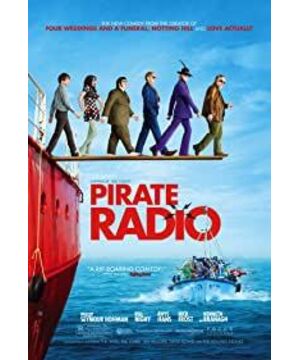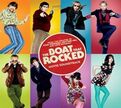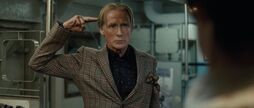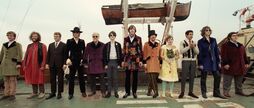"Pirate Radio" is a private radio station independent of the system. It plays rock music 24 hours a day. It is a symbol of freedom and liberation and is very popular among the people. They also became a thorn in the eyes of the British authorities, because the government hated free people the most, and in the eyes of the authorities they were "dirty sewers, irresponsible commercialism, and low morals". But there was nothing illegal about the existence of "pirate radio stations" at that time, so what the government had to do was "if you don't like something, make up a law and make it illegal". It is against this background that the film tells about the final glory of "Pirate Radio".
The starting point of the film is that a teenager Carl boarded the base ship of "Pirate Radio", thus witnessing and unfolding the legend of "Pirate Radio". Karl was obviously a "bad boy" in the traditional concept, and was no longer "accepted" by the school or even society. In desperation, his mother sent him on the boat (Carl later told the people on the boat that as long as you like me). But here is the "ship of freedom", not a place of control, so his mother is actually very enlightened. Sending him aboard is to let him get out of the rigid and absurd growth environment and develop freely.
This ship is also the "Love Ship", and Carl will experience his youth and growth. In the first half of the film, the constant frustration of love (sex) brings out the friendship and the way of getting along between men.
The ship was a man's world, the only woman was a gay cook, and the girls were only allowed on the ship every Saturday. One time, fat DJ Dave wanted to use up his Baoji to make Carl break in the dark, but the girl turned on at a critical moment and waited. Afterwards, Quentin, the boss of "Pirate Radio" and Karl's godfather, introduced the girl to Karl alone. Every time Karl was looking for a condom, the girl went to Dave's bed. Of course Karl was very depressed. John in charge of the news and the black guy Harold took a cup of tea (the British should drink tea instead of milk) and a small plate of biscuits and sat beside him and ate. Calm down too, lovely piece.
Another climax in the film is caused by the marriage of Simon, who is not a woman. The beautiful girl who married him was actually just taking advantage of Simon, and her purpose was to get on the boat and fall into the arms of the legendary DJ Gavin, a superstar in the radio world. Although the girl left soon, Gavin broke the tacit understanding and rules between men and broke Simon's heart. Conte from the United States came forward to single out. In addition to representing Simon, Conte also has his own reasons, as the radio headliner, he has a mixed mentality about Gavin's return. The way of heads-up is a "courage test". The two compete to climb the mast of the ship. Passing the test will naturally turn the battle into jade and silk, and solve the incident in a man's way.
In the second half of the film, Carl finally got love, and the broken place became one of the important signs of growth, and under the attention and blessings of everyone, it looked very beautiful. The appearance of his mother also solved the mystery of his biological father. The story about Carl is basically complete, but it seems to be nothing more than that. Growth consists of events, but there is no psychological echo, and there is no deeper development and change. Carl is still the same Carl. His interaction with "Pirate Radio" also appears to be insufficient.
Richard Curtis, who was a screenwriter, is good at the performance of fragmented scenes and the characterization of characters. Compared with "Four Weddings and a Funeral" (screenwriter) and "Love Actually" (director), he is more holistic. The pros and cons of the sexual "Pirate Radio" are equally obvious. The delicate descriptions of some of the events mentioned above, the wonderful lines, and the distinctive characters are the highlights of the film; in contrast, the overall story and drama of the film are slightly "gentle", and some sensational passages include the ending Lack of surprises, except for Carl, the portrayal of government officials as villains has not changed more with the development of events, the sense of conflict is not enough, it seems ironic and superficial.
Of course, the music of the film is also worthy of attention. The original soundtrack has a total of 37 classic rock songs on the dual CD, which can be heard all at once. Personally, I feel that putting so many songs in the movie, and then the dialogue and the songs alternate for a while, have no special features. In addition, bright tight suits, black and white plaids, polka dot shirts, sunglasses, eye makeup, BOB heads and other characters' dresses, together with rock music, are enough to be retro and nostalgic.
Pirate radio is a thing of the past, but instead of dying, independent radio and rock and roll thrived. Just like the countless ships that came to rescue when the "Pirate Radio" at the end was about to sink, history will witness the people's choice. Freedom leads the people, rock and roll never die.
View more about The Boat That Rocked reviews











